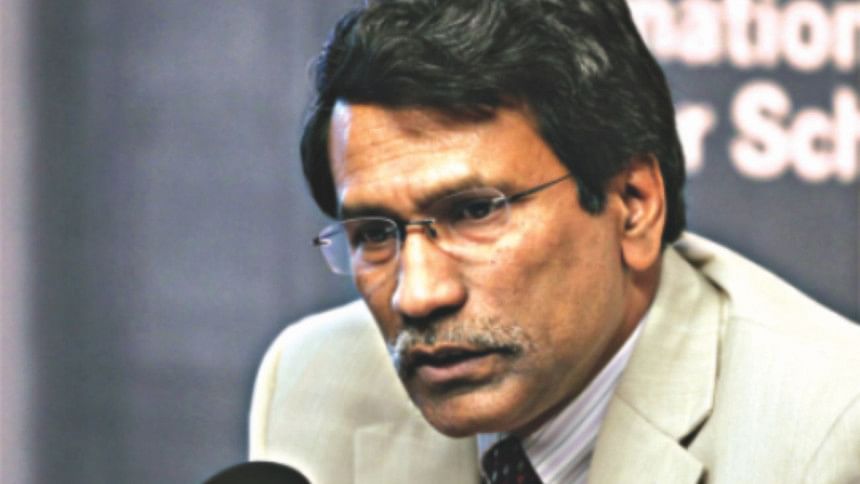Repatriation deal rushed into

With no virtual progress over Rohingya repatriation, an international expert has said the likelihood of repatriation deal implementation signed on November 23 last year is "slim to none" and the signing of such a deal was a "mistake".
"The deal, as it stands now, is inadequate and likelihood of its implementation is slim to none. Therefore, it was a mistake to sign it," Ali Riaz, a distinguished professor at the Illinois State University, told the news agency.
Explaining his observation, Prof Riaz said any repatriation effort would eventually require a deal between the two countries. "Therefore, the problem is not signing a deal but the details of the arrangements."
He said the problems include the contents of the agreement, the process through which the deal was reached, the absence of mechanisms of implementation, and lack of involvement of international bodies. Director of Centre for Genocide Studies at Dhaka University Prof Imtiaz Ahmed said Bangladesh currently has a Rohingya population, which is far more than Bhutan's entire population. Bhutan has around eight lakh people whereas Bangladesh now shelters some 1.2 million Rohingyas. On Thursday, Prime Minister Sheikh Hasina said although Bangladesh and Myanmar were making various efforts, including the signing of a deal, there has been no virtual progress in the repatriation of over a million Rohingyas from Bangladesh.
Prof Riaz, a Bangladeshi-American political scientist and writer, said many of them had underscored the importance of the above-mentioned elements even before any negotiations started, but unfortunately those voices were "ignored". There are "many ambiguities" in the deal, including the definition of the refugees and determination of their status, he said.
"The deal has been rushed into, ostensibly under external prodding, reportedly at the Chinese insistence. In the rush, the agreed deals have helped vindicate Myanmar's positions rather than accommodating Bangladesh's needs," Prof Riaz explained.
From the very beginning, he has been arguing that the involvements of international entities are necessary for implementation. "Although some of the international bodies now have been brought into, they've remained outside the agreement. There's no penalty clause, no arbitration mechanism."
The government is likely to sign a memorandum of understanding (MoU) with the Office of the United Nations High Commissioner for Refugees (UNHCR) on April 13, a diplomatic source said.
UNHCR teams -- if the MoU is signed -- will interview prospective returnees to determine if their decision to return to Myanmar was voluntary with support from the Bangladesh authorities.
Responding to a question on involvement of a third party in repatriation process, Prof Riaz said the recent involvements, which he has referred to, should have been from the beginning, particularly at the drafting stage of the deals.
"It's better late than never. But now it largely depends on how much Myanmar will allow the UNHCR to play a role. If the involvements of these organisations were a part of the deals, by now we would have seen positive movements," he said.
Bangladesh and Myanmar signed the repatriation agreement on November 23, 2017.
On January 16, Bangladesh and Myanmar signed a document on “Physical Arrangement”, which is supposed to facilitate the return of Rohingyas to their homeland from Bangladesh.
The “Physical Arrangement” stipulates that the repatriation will be completed preferably within two years from the start of repatriation.
"On our part, Bangladesh will continue to work in good faith with Myanmar to help find a comprehensive and durable solution to this protracted humanitarian situation," said State Minister for Foreign Affairs M Shahriar Alam.
He said without meaningful changes on the ground, the displaced Rohingyas would not regain the confidence to opt for voluntary return. "They deserve the world's sustained engagement to create a situation conducive to their voluntary, safe and dignified return to Rakhine State as soon as possible," the minister said.
Meanwhile, Myanmar is sending its Social Welfare, Relief and Resettlement Minister Win Myat Aye soon to visit Rohingya camps in Cox's Bazar. This will be the first such visit by any Myanmar minister to the large Rohingya refugee camp where some 700,000 refugees have sheltered since August last year following an army crackdown on this minority community in Rakhine. The UN has likened it to ethnic cleansing.
The Myanmar minister, Win Myat Aye, is scheduled to arrive on April 11 and will visit Rohingya camps the next day, a foreign ministry source said without elaborating on his programme.
Though there have been high-level visits from Myanmar, including minister, no one of them did visit the Rohingya camps. The government will soon send the second list consisting of up to 10,000 names of Rohingyas to Myanmar as part of the repatriation process.
Bangladesh has already handed over a list of 1,673 Rohingya families (8,032 individuals) to Myanmar to start the first phase of repatriation of the displaced people to their homeland, but there is no sign of their repatriation yet.

 For all latest news, follow The Daily Star's Google News channel.
For all latest news, follow The Daily Star's Google News channel. 



Comments